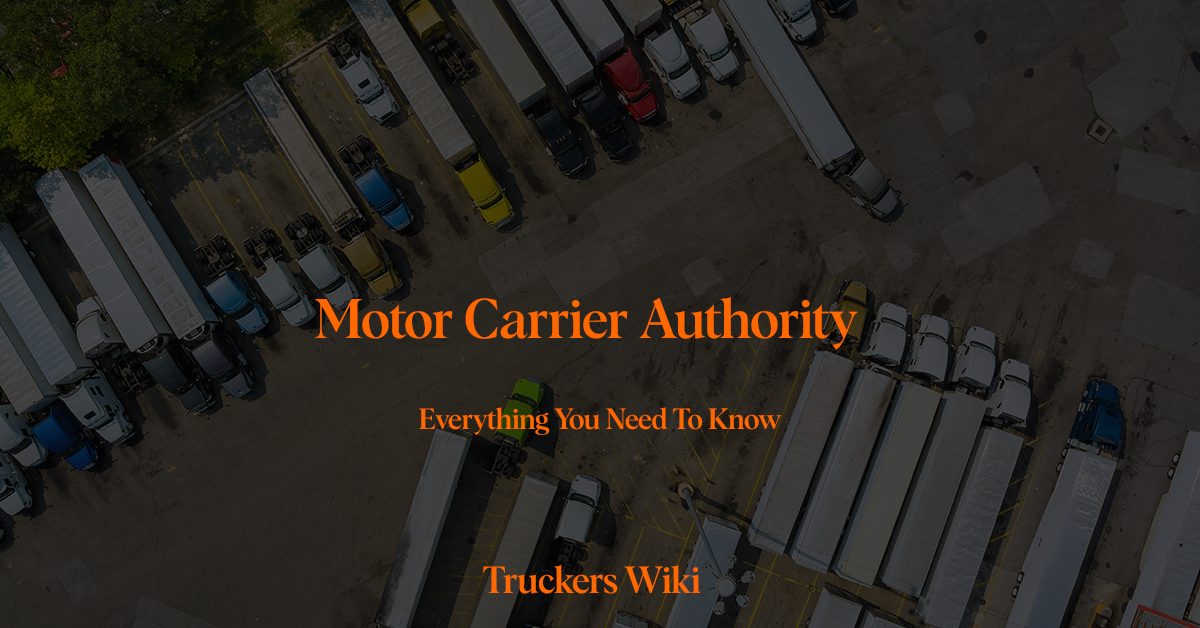
Table of Contents
What is Motor Carrier Authority?
Motor Carrier Authority, also known as Operating Authority, is essentially a permit that authorizes freight transportation companies to haul loads across state lines for commercial purposes. The FMCSA issues this authority, and it’s essential for companies or independent owner-operators that intend to operate as for-hire carriers.
The MC Authority is associated with an MC number, unique to each carrier or operator, which must be displayed on the sides of the vehicle. This number is used to identify carriers and check their safety information, compliance reviews, crash information, and more.
Types of Motor Carrier Authority
There are different types of Motor Carrier Authority, each catering to specific services and freight types within the trucking industry. The primary types are:
1. Motor Carrier of Property (Except Household Goods): This authority is for carriers hauling commodities for-hire, excluding household goods.
2. Motor Carrier of Household Goods: This authority is designated for carriers transporting household goods for-hire.
3. Broker of Property: This authority applies to those who arrange for the transportation of property (excluding household goods) by motor vehicle.
4. Broker of Household Goods: This authority is for those who arrange the transportation of household goods by motor vehicle.
How to Start a Trucking Company and Obtain a Motor Carrier Authority
Step 1: Choose Your Business Structure
First things first, let’s talk about the foundation of your business. You have a few options here: an LLC (Limited Liability Company), a corporation, or a sole proprietorship. Each has its perks and considerations, especially when it comes to liability and taxes. Think about what fits your vision and financial plans best.
Step 2: Get Your EIN
Next up, you’ll need an Employer Identification Number (EIN) from the IRS. It’s like a social security number for your business, and it’s absolutely free. This little number allows you to hire employees, open a business bank account, and generally get the ball rolling.
Submitting an OP-1 Form: This application form can be filled out and submitted online through the FMCSA’s website. Visit FMCSA OP-1 application page here.
Paying the Application Fee: The FMCSA charges a one-time filing fee for the processing of the Operating Authority application.
Interstate vs. Intrastate: What’s Your Route?
Before hitting the gas, decide whether you’ll operate across state lines (interstate) or stick within your state (intrastate). This decision influences the permits and filings you’ll need:
- Interstate: Gear up for obtaining a USDOT number and an MC number, with a combined cost of around $300. These are essential for legal operation and compliance with safety regulations.
- Intrastate: Your requirements might vary based on state regulations, but generally, the focus is more localized.
Learn about Interstate and Intrastate trucking here.
Step 3: Tackle Regulatory Filings and Insurance
- BOC-3 Form: This document appoints a process agent in every state you’ll operate in, making sure you’re covered legally.
- Insurance Time: You’ll need at least $750,000 in liability insurance for interstate operations, though $1 million in liability and $100,000 in cargo insurance are often required to work with brokers.
Step 4: Dive into Federal and State Requirements
- Heavy Hitters: File Form 2290 if your vehicle’s taxable gross weight is 55,000 pounds or more. This form is all about the Heavy Highway Vehicle Use Tax.
- Going the Distance: For interstate adventurers, you’ll need to join the IRP and comply with the IFTA for your vehicle registration and fuel taxes. It’s a bit of paperwork, but it keeps you running smoothly across state lines.
Step 5: Special State Permits and Considerations
Depending on your state, there might be a few extra hoops to jump through. States like Kentucky, New Mexico, New York, and Oregon have specific permits for truckers, so be sure to check what’s needed in your area.
Once these steps have been completed, the FMCSA will issue a granted letter and the MC number will become active.
Why is Motor Carrier Authority Important?
Operating without a valid MC Authority is considered illegal and can result in severe penalties. Moreover, having an MC Authority provides legitimacy to a trucking business, increasing its credibility and potential for growth. It’s also a prerequisite for obtaining freight contracts, and many shippers and freight brokers will only work with carriers who hold valid authority.
In conclusion, Motor Carrier Authority is a pivotal element for anyone looking to start or operate a freight transportation business within the United States. By understanding its purpose, importance, and the process to obtain it, you can ensure your trucking operations are compliant, credible, and ready to thrive in the competitive trucking industry.

